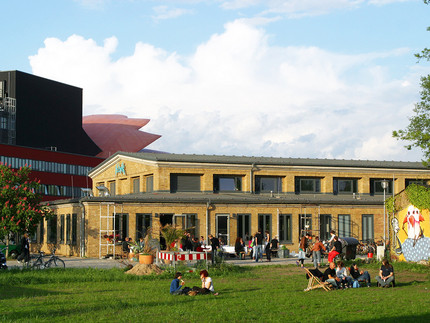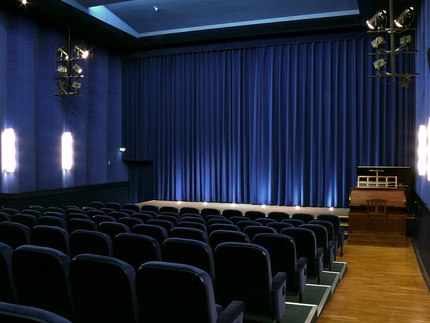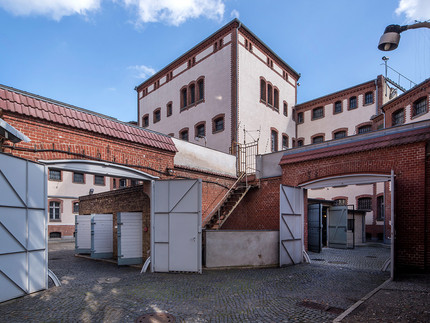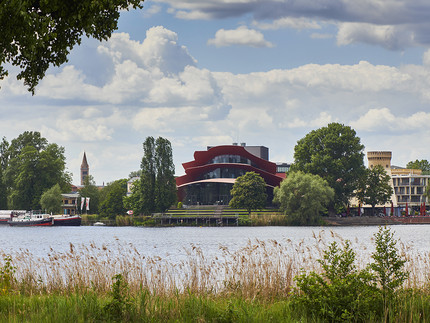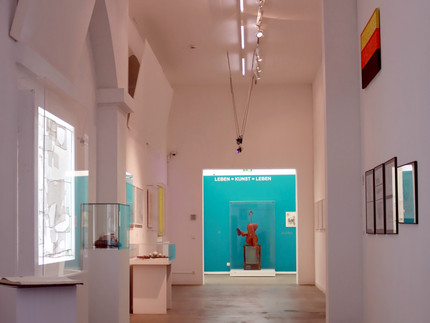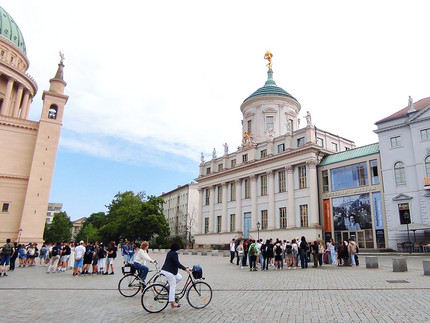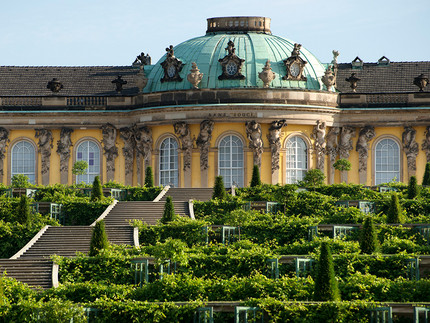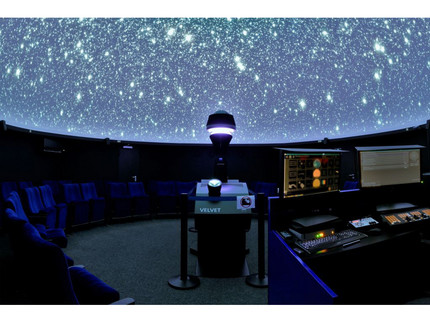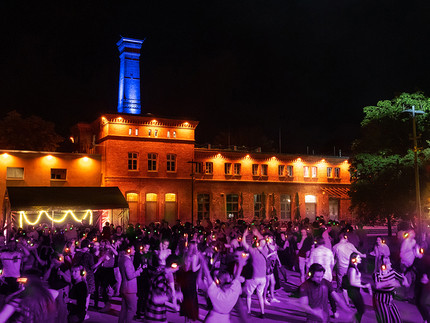Cultural Institutions in Potsdam
If you approach Potsdam from the water, you can see the red shell-like structure of the Hans Otto Theater on the shore of the Tiefer See. There, on Schiffbauergasse, a unique cultural area for modern theater, experimental dance and contemporary art has been created. Right in the middle of it is the Waschhaus with its rock and pop arena and the small stages for jazz and world music. Downtown, you will find the Nikolaisaal, which also serves as a location for concerts by the university choir and orchestra, the Barberini Museum and the the Potsdam Museum. Potsdam has something to offer for everyone. You can get to know some of these institutions on November 6, 2020 at “WarmUP in Potsdam”, since they offer free tickets or special offers for UP students on that day. You can find more detailed information on our Program website.
DAS MINSK Kunsthaus in Potsdam
At the MINSK Kunsthaus in Potsdam, works of art from the former GDR, which are part of the Hasso Plattner Collection, are shown in new contexts. The former terrace restaurant was built in the 1970s in the modernist style of the GDR.
From September 7, 2024 to January 5, 2025, DAS MINSK will be showing the largest institutional exhibition of works by the artist Noah Davis (1983-2015) to date. With over 50 works from his entire oeuvre, the large traveling exhibition offers a comprehensive overview of Davis' extraordinary oeuvre. It is the artist's first institutional retrospective; following the opening at MINSK, it will be shown at the Barbican, London, and the Hammer Museum, Los Angeles.
fabrik Potsdam
The fabrik Potsdam - International Center for Dance and Movement Arts - is a house for professional dancers and dance companies and at the same time a house for everyone who wants to see, understand and try out dance.
Dance performances by young dancers and world-renowned choreographers, the residency program, the Potsdamer Tanztage (Potsdam Dance Days) as an annual international festival for contemporary dance, workshops and regular courses for bodywork and dance (for amateurs, professionals, children and adults) characterize the profile of the fabrik Potsdam. The fabrik's café and beer garden invite visitors to linger before and after the plays.
Websites: www.fabrikpotsdam.de | www.potsdamer-tanztage.de | www.madeinpotsdam.com
facebook: fabrik Potsdam / Potsdamer Tanztage
Instagram: fabrikpotsdam
Youtube: fabrik Potsdam
Filmmuseum Potsdam
The Filmmuseum Potsdam, an institute of the Babelsberg KONRAD WOLF Film University, preserves, presents and communicates Babelsberg's film history.
In the permanent exhibition TRAUMFABRIK - 100 YEARS OF FILM IN BABELSBERG, visitors experience how films are made from the script to the premiere. Temporary and foyer exhibitions as well as the "Object of the Month" take up various film themes.
Classics and the latest productions are shown in the cinema, and silent films are regularly accompanied by live music or the Welte cinema organ. Prominent guests participate in discussions and film evenings.
The Film Museum's collections preserve bequests, films, costumes, over one million photos, set design sketches, props, film posters, historic film cameras and technology, and much more.
Lindenstraße Memorial
The Lindenstraße Memorial is one of Brandenburg's central places of remembrance and education. Located in the heart of Potsdam, it is housed in a former prison and courthouse and commemorates political persecution and imprisonment during the Nazi dictatorship, the Soviet occupation zone, and the GDR, but also the overthrow of the SED dictatorship through the Peaceful Revolution of 1989/90.
As an open place of learning about history, the memorial invites visitors to explore it individually with or without an audio guide (German, easy language, German Sign Language, English, French, Spanish) or as part of guided tours, discussions with contemporary witnesses, project days, workshops, and public events such as special exhibitions and lectures.
Hans Otto Theater
The Hans Otto Theater is the theater of the city of Potsdam. Its main venues on Schiffbauergasse are the Großes Haus, a new stage building opened in 2006 by Pritzker Prize winner Gottfried Böhm, and the nearby Reithalle, which also houses the Box riding hall. There is also an open air summer stage at Tiefer See, which is located right in front of the Großes Haus.
Since the 2018/19 season, Bettina Jahnke has been the managing director of the Hans Otto Theater with its 23-member permanent ensemble. In addition to her artistic direction, the artistic identity of the theater is shaped by directors with a wide range of experience as well as young directing talents. They are characterized by conceptually strong styles with political poignancy, pictorial aesthetics and an interest in ensemble work.
You can see the trailer for the current season here.
Kammerakademie Potsdam
Since 2001, the Kammerakademie Potsdam (KAP) has shaped the musical life of the state capital. As the resident orchestra of the Nikolaisaal, the KAP creates captivating musical experiences and roams through four centuries of music history with great curiosity. From Potsdam, the KAP radiates its charisma throughout the world – with major concert tours at home and abroad and award-winning CD recordings. Several OPUS KLASSIK awards, the founding of Brandenburg's first orchestra academy, and a steadily growing audience underscore the success and innovative spirit of the musicians. A new chapter will begin in the summer of 2025: after 15 years, Antonello Manacorda, who will remain associated with the orchestra as honorary conductor, will hand over the artistic direction to oboist and conductor François Leleux.
Webseite | Instagram | Facebook
Museum Barberini
The Museum Barberini has been the art museum in Potsdam's historic center since 2017, donated by SAP founder and patron Hasso Plattner. Since September 2020, the museum has been presenting the donor's extensive collection of Impressionist and Post-Impressionist paintings, including masterpieces by Monet, Renoir, Caillebotte and Signac, alongside temporary exhibitions in international collaborations. In addition to the collection, the upcoming exhibitions will focus on the artists Maurice de Vlaminck, Camille Pissarro and Paul Signac as well as themes such as geometric abstraction and the unicorn.
Students receive free admission when visiting as part of a course or participating in symposia at the Barberini. Every Thursday, admission is free for all under 25s from 2pm to 7pm (until 31.12.2024).
museum FLUXUS+
The FLUXUS+ museum in Potsdam exhibits modern and contemporary art with a focus on Fluxus and Wolf Vostell. In addition to Wolf Vostell, the collection includes works by Emmett Williams, Ben Patterson, Yoko Ono, Nam June Paik, Mary Bauermeister and Niki de Saint-Phalle. Special exhibitions such as “Mary Bauermeister” (8.9.2024 - January 2025) in the atrium, the museum café with terrace and the museum store make the museum FLUXUS+ a popular cultural meeting place on the Havel.
All students in their first semester receive free admission until 31.03.2025 on presentation of their student ID card.
Web | Instagram | Facebook | Youtube
Nikolaisaal Potsdam
Right in the heart of the city, the Nikolaisaal has established itself as the first address for good music in Potsdam with its attractive and unconventional program.
Exciting contrasts and stylistic openness, which are typical of the architecture of the building, also characterize the Nikolaisaal's programme. It is aimed at classical concertgoers as well as open-minded newcomers. With a total of 13 different concert series, a broad spectrum of musical styles and genres is offered for all generations: Classical, pop and film music take place here as well as jazz, chamber music and dance. With exciting crossovers of styles, imaginative children's and workshop projects, new productions and German premieres, top-class artists delight a curious and discerning audience.
Nikolaissaal: Web | Instagram | Facebook
Musikfestspiele Potsdam: Web | Instagram | Facebook | Youtube
Potsdam Museum – Forum für Kunst und Geschichte
On the historic Alter Markt, the oldest building on the square is home to the modern Potsdam Museum. With free admission, the permanent exhibition “Potsdam. A city makes history” vividly tells 1000 years of the city's history. Various special exhibitions delve deeper into individual topics.
History to take away!
Our special tip: With the new PotsdamHistory app, you can discover Potsdam's fascinating and multifaceted history from home on the sofa or on the go in the city: historical photos and city maps, lost places, exclusive city tours, captivating before and after pictures, important events, eras, personalities - and much more.
More information here. Free of charge in the app stores.
Web | Facebook | Instagram | Youtube
Rechenzentrum Potsdam
The Rechenzentrum is a vibrant hub of artistic, (socio)cultural, and creative production and encounter in the center of Potsdam. The former GDR administrative building is a place for artists and creative professionals, for social projects, for events, and for encounters—in short, it is Brandenburg's largest socio-creative center.
For over 10 years, this unique location has been intensively used as an art and creative center and is rented out to capacity. Over the years, the user community has become increasingly younger and more heterogeneous. It is active in the fields of design, film, visual and performing arts, music, and sociocultural work, participation, and education, among others. Self-employed individuals, collectives, non-profit associations, small companies, and social institutions are among the users of the more than 5,000 m² of floor space in over 220 rooms.
Every week, many different events such as exhibitions, film screenings, discussion formats, workshops, language courses, and parties attract hundreds of visitors to the Rechenzentrum.
Schiffbauergasse International Art and Culture Quarter
94,000 square meters, 700,000 visitors, almost 40 residents and 2,000 cultural programs a year: The International Art and Culture Quarter Schiffbauergasse on Tiefen See is a creative center and a place to relax in the middle of Potsdam. Between industrial monuments, historic riding halls, anchored ships and modern architecture, contemporary art exhibitions meet theater, dance or literature and cultural education programs meet open-air concerts. And the love of good food is not neglected either. Spacious green spaces on the waterfront, the marina, the playground and various leisure activities on and around the water make Schiffbauergasse a place to relax and experience nature.
Stiftung Preußische Schlösser und Gärten Berlin-Brandenburg
Since 1995, the Prussian Palaces and Gardens Foundation Berlin-Brandenburg (SPSG) has been responsible for more than 30 museum palaces and numerous parks in Brandenburg and Berlin, which attract more than 3.5 million visitors from Germany and abroad every year. This includes the unique cultural landscape stretching from Sanssouci Palace in Potsdam to Peacock Island in Berlin, which has been a UNESCO World Heritage Site since 1990. The SPSG makes this historical Gesamtkunstwerk accessible to the public and is committed to democratic values and an open, diverse society. Its work is supported by the Federal Government Commissioner for Culture and the Media, the State of Brandenburg, the State of Berlin, and private donations.
T-Werk
The T-Werk, Internationales Theater- und Theaterpädagogikzentrum, has had its own venue in Schiffbauergasse for more than fifteen years. It offers a varied and contemporary program of events for children, young people and adults all year round. Musical theater, drama, mask and puppet theater are just as much a part of the repertoire as concerts, readings and workshops. Special highlights of the program are the annual festivals and long nights. These include the international theater festival UNIDRAM, the RADAR festival, the Schirrhofnächte, the Winter Circus and the Long Night of Independent Theater.
Webseite | Facebook | Instagram | Youtube
URANIA-Planetarium and Bürgel Memorial
Our dome room is an interactive star theater where you can experience the universe. Whether it's a fascinating 360° film or a live program under the starry sky, we take you on an entertaining and educational journey through space. Our digital projection system allows us to present new discoveries to the audience: whether it's a planetary system around distant stars or the flash of a supernova—we fly you there and show you the wonders of the cosmos. In our cultural program, you can be enchanted by concerts or readings under the starry sky.
Waschhaus Potsdam
Since the early 1990s, the Waschhaus Potsdam has developed from a squat into one of the largest socio-cultural centers in the state of Brandenburg. With a diverse program of events in the fields of dance, contemporary art, club culture as well as concerts and literary events, the cultural center reaches over 120,000 visitors a year. At the same time, the Waschhaus acts as an innovative platform for new possibilities of artistic expression and specifically promotes the work of young artists. The networking of and with actors within Potsdam's urban society and the promotion of cultural participation are important elements of the center's self-image, both now and in the future.



